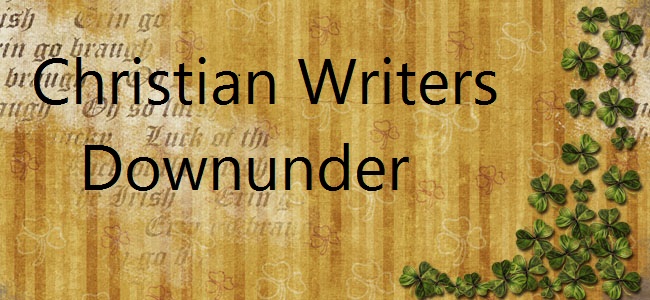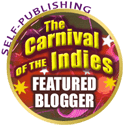Each Thursday in 2018 we will be interviewing one of the members of Christian Writers Downunder – to find out a little bit more about them and their writing/editing goals. Today we're interviewing Iola Goulton.
Question 1: Tells us three things about who you are and where you come from.
My name is Iola Goulton, which is pronounced yo-la (not eye-ola). It's a Welsh name and means "valued by the Lord". I think that's a great reminder to me, and to all of us.I was born in Wales - yes, there is a reason for the Welsh name. But my family immigrated to New Zealand when I was a small child, so I consider myself a Kiwi.
I live in Tauranga, which is a small coastal city around an hour from Hobbiton. If anyone ever does one of those around New Zealand cruises, let me know—Tauranga is usually one of the ports of call, and I'd love to take you for coffee (yes, after you've been to Hobbiton).
Question 2: Tell us about your writing (or editing/illustrating etc). What do you write and why?
I'm a freelance editor specialising in Christian fiction (you can find me at www.christianediting.co.nz).Why? Because I love reading Christian fiction, and I want to help pre-published authors be the best they can be. Kiwi and Aussie authors can match up with the best in the world (as proved this year, when Kara Isaac won the Romance Writers of American RITA Award for Romance with Religious or Spiritual Elements with her third novel, Then There Was You).
I do also write, but it's mostly book reviews and blog posts (on writing, editing, publishing, and marketing). I did complete a manuscript for a novella as preparation for a Margie Lawson immersion, and that went on to win a 2016 American Christian Fiction Writers Genesis Award.
Question 3: Who has read your work? Who would you like to read it?
I publish my book reviews at www.iolagoulton.com, and my editing posts at www.christianediting.co.nz. I'm also a regular guest at The Christian Proofreaders and Editors Network, at Australasian Christian Writers, and International Christian Fiction Writers.So my work is available to anyone with an internet connection. But who am I writing for? The reviews are for Christian fiction readers (especially romance fans), while my non-fiction is for authors, particularly Christian fiction authors (whether published or pre-published).
Question 4: Tell us something about your process. What challenges do you face? What helps you the most?
As an editor, I want my work to be as good as it can be—no misspelled words or unfinished sentences (although I find I'm guilty of both when I re-read old blog posts!).My basic process for a blog post:
- Come up with an idea and mull on it.
- Write the draft.
- Leave it for a week (ideally longer).
- Revise and edit.
- Spellcheck.
- Proofread.
- Schedule the post, and create a shareable graphic.
- Read six months later and find three glaring errors that weren't there when I proofed the post.
- Sigh and move on.
I also reuse content where possible. For example, I'll update and reshare ACW posts on my own website or vice versa, and I'll take a popular post and shorten it to submit to the Christian PEN (which has a 500-word maximum for posts).
Question 5: What is your favourite Writing Craft Book and why?
I can't pick just one!The books I recommend most often to clients are:
- Revision and Self-Editing by James Scott Bell
- Self-Editing for Fiction Writers by Renni Browne and Dave King
- Understanding Show, Don't Tell by Janice Hardy
- Rivet Your Readers with Deep Point of View by Jill Elizabeth Nelson
- Structuring Your Novel by KM Weiland
- Story Genius by Lisa Cron
I'm also a big fan of Margie Lawson's courses.
These cover all the basics of writing, revising, and editing. Then it's just (just!) a case of BISFOK (bottom in seat, fingers on keyboard).
Question 6: If you were to give a shout-out to a CWD author, writer, editor or illustrator – who would they be?
The CWD admins, especially Jeanette O'Hagan. As an admin for Australasian Christian Writers and International Christian Fiction Writers I know how much work goes in behind the scenes of a blog like this. It's a lot more work than people think.
Paula Vince, for reaching out to me after I reviewed one of her books on Amazon and inviting me to be a part of the trans-Tasman writing community.
Rochelle Manners of Rhiza Press for inviting me to my first writing conference, and encouraging me as an editor by asking me to edit for her, and recommending me to her authors.
And all the members of the many online and offline writing groups I'm part of. You all inspire me at different times and in different ways.
Question 7: What are your writing goals for 2018? How will you achieve them?
Well, it's almost the end of 2018, so I'll say how I've done instead! I had wanted to get back into writing fiction, but that hasn't happened (yet. There's still a couple of months ...)In terms of non-fiction, I wanted to post weekly on my blog, and produce a regular monthly newsletter. I've achieved that, along with regular posts at Australasian Christian Writers, and two guest posts at Bad RedHead Media. I was also thrilled to be a Featured Blogger at Joel Friedlander's Carnival of the Indies with this post: A (Not So) Brief History of Fake Reviews.
I've also managed to keep to a regular schedule on my review blog. I have missed a couple of dates - sometimes it's so much easier to read the books than write the reviews!
Question 8: How does your faith impact and shape your writing?
I have been a Christian since I was about seven and my best friend lead me through the Sinner's Prayer one Thursday morning after Bible in Schools. Even as a child growing up in a non-Christian home it seemed obvious to me that there was a Creator, so it wasn't difficult to believe that was the God of the Bible, and that Jesus was the way to Him. I'm an introvert, so I'm not the type to stand on street corners and shout that at people, so I do what I can to point to Him through my writing and editing.I write and edit for the Christian community for two reasons: I want to help build Christian writers and the Christian writing community to share the gospel and build up others, and I don't want to be forced to read or edit content that contradicts the Christian world view. I don't limit myself to only editing Christian works, but I don't want to edit anything that actively promotes an anti-Christian view. Fortunately, my chosen business name puts off those people who aren't my target clients :)
About Iola Goulton
 Iola Goulton is a New Zealand book reviewer, freelance editor, and author, writing contemporary Christian romance with a Kiwi twist. She is a member of the Sisterhood of Unpronounceable Names (Iola is pronounced yo-la, not eye-ola and definitely not Lola).
Iola Goulton is a New Zealand book reviewer, freelance editor, and author, writing contemporary Christian romance with a Kiwi twist. She is a member of the Sisterhood of Unpronounceable Names (Iola is pronounced yo-la, not eye-ola and definitely not Lola). Iola holds a degree in marketing, has a background in human resource consulting, works as a freelance editor, and has developed the Kick-Start Your Author Platform Marketing Challenge, an email course for authors wanting to establish their online platform.
When she’s not working, Iola is usually reading or writing her next book review. Iola lives in the beautiful Bay of Plenty in New Zealand (not far from Hobbiton) with her husband, two teenagers and one cat. She is currently working on her first novel.




































